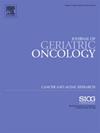Will evidence-based patient-centred care meet the future inter-generational needs of older adults with cancer? A diverse perspective
IF 3
3区 医学
Q3 GERIATRICS & GERONTOLOGY
引用次数: 0
Abstract
The introduction of evidence-based patient-centred care (EBPCC) into the cancer treatment pathway requires older adults with cancer and their support networks to actively participate in the decision-making process. EBPCC is a combination of evidence-based practice (EBP) and patient-centred care (PCC). EBPCC is a healthcare approach that focuses on the needs and preferences of the patient. However, the increasingly complex nature of cancer treatment options, the heterogeneity of older adults, and the probability of comorbidities can make it a complicated and difficult task for older adults with cancer to process these options, evaluate the information presented, and determine their preferred treatment pathway.
EBPCC can effectively facilitate shared decision-making in the clinic for older adults with cancer but may not fulfil the healthcare expectations of all older adults. Older adult patients newly diagnosed with cancer may expect a more holistic approach to their care, with emphasis on ‘what matters most for the patient?’
In this paper, we consider EBPCC and its effectiveness in building active collaboration between clinicians and older adults with cancer. We examine EBPCC from both clinician and patient perspectives and reflect on the extent that heterogeneity, comorbidities, and generational characteristics influence these perspectives. We then evaluate the cancer clinical pathway for its preparedness to meet the future needs of this heterogenous population.
循证的以病人为中心的护理能否满足老年癌症患者未来的代际需求?不同的视角
将循证患者为中心的护理(EBPCC)引入癌症治疗途径,需要患有癌症的老年人及其支持网络积极参与决策过程。EBPCC是循证实践(EBP)和以患者为中心的护理(PCC)的结合。EBPCC是一种专注于患者需求和偏好的医疗保健方法。然而,癌症治疗方案的复杂性、老年人的异质性以及合并症的可能性使得老年癌症患者处理这些方案、评估所提供的信息并确定他们首选的治疗途径成为一项复杂而困难的任务。EBPCC可以有效地促进老年癌症患者的临床共同决策,但可能无法满足所有老年人的医疗保健期望。新诊断为癌症的老年患者可能会期待一种更全面的护理方法,强调“对患者最重要的是什么?”“在本文中,我们考虑EBPCC及其在临床医生和老年癌症患者之间建立积极合作方面的有效性。我们从临床医生和患者的角度研究EBPCC,并反映异质性、合并症和代际特征对这些观点的影响程度。然后我们评估癌症临床途径的准备,以满足这一异质性人群的未来需求。
本文章由计算机程序翻译,如有差异,请以英文原文为准。
求助全文
约1分钟内获得全文
求助全文
来源期刊

Journal of geriatric oncology
ONCOLOGY-GERIATRICS & GERONTOLOGY
CiteScore
5.30
自引率
10.00%
发文量
379
审稿时长
80 days
期刊介绍:
The Journal of Geriatric Oncology is an international, multidisciplinary journal which is focused on advancing research in the treatment and survivorship issues of older adults with cancer, as well as literature relevant to education and policy development in geriatric oncology.
The journal welcomes the submission of manuscripts in the following categories:
• Original research articles
• Review articles
• Clinical trials
• Education and training articles
• Short communications
• Perspectives
• Meeting reports
• Letters to the Editor.
 求助内容:
求助内容: 应助结果提醒方式:
应助结果提醒方式:


